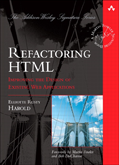Why VRML Failed and What That Means for OpenOffice
Wednesday, April 25th, 2007Why was VRML an also-ran in the flood of new technologies introduced in the 1990s? It wasn’t fundamentally broken or a bad idea. It wasn’t worse than other technologies of the day like Java 1.0 and Shockwave. It certainly didn’t suffer from a lack of hype, investment, or development resources compared to the winners. VRML fail for one reason and one reason only: it didn’t run on the Mac; and OpenOffice is failing now for the same reason.
(more…)
